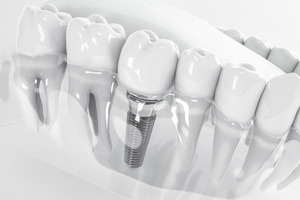
Dental implants can mimic the appearance, feel, and function of natural teeth very closely. In fact, some people say that they’re the next best thing to getting your real teeth back! But what does this mean when it comes to tooth decay? Are your implant posts at risk for cavities like the rest of your smile? Here is what you need to know about dental implants and what they mean for your oral health.
What are Dental Implants?
Dental implants are very unique compared to other tooth replacements. They are shaped like screws and are usually made of titanium. When they’re placed in your jaw, a process called osseointegration takes place; as a result, the implant posts fuse with the surrounding bone. With properly placed dental implants and a personalized restoration (such as a crown, bridge, or denture), you can replace any number of teeth.
So Can Dental Implants Get Cavities?
As a matter of fact, it is impossible for dental implants to get cavities. This is thanks to the fact that the materials used to make the implant posts and the final restoration(s) are not vulnerable to decay-causing bacteria.
However, gum disease is still a concern with dental implants. If too much plaque and tartar are allowed to build up in the area, the gums may become infected and start to pull back from the implant posts, causing them to come loose. Excellent oral hygiene is a must if you want to keep your gums healthy and retain your dental implants.
How Can You Keep Your Dental Implants Clean?
Obviously, brushing is a very important step for making sure that your dental implants and the tissues around them stay clean. Electric and manual toothbrushes are both effective, but whichever kind you use, make sure it has soft bristles that won’t scratch your prosthetic tooth.
Flossing is key for removing food particles and bacteria from the hard-to-reach spaces around your dental implants. It’s recommended that you use a floss threader if you’re having trouble maneuvering the thread by yourself; a water flosser can also be helpful.
Even if you’re very diligent about brushing and flossing, there might still be plaque and tartar buildup in certain areas of your mouth. To make sure that your dental implants and the rest of your smile stay in good shape, you should have a professional dental cleaning performed twice a year. During these visits, your dentist can give you a heads-up about any warning signs of gum disease.
In short, cavities are not an issue with dental implants, but oral hygiene is still of the utmost importance for protecting them. Take a look at your oral hygiene habits and see if there’s any room for improvement.
About the Author
Dr. Dan Greenwood earned his Doctor of Dental Surgery from the Ohio State University. He has been operating Greenwood Dental since 1998, and he aims to provide a trustworthy dental home for all of his patients in Sagamore Hills. If you have lost any teeth, he can replace them with stable, lifelike dental implants. To schedule a consultation with Dr. Greenwood, visit his website or call (330) 467-2522.
